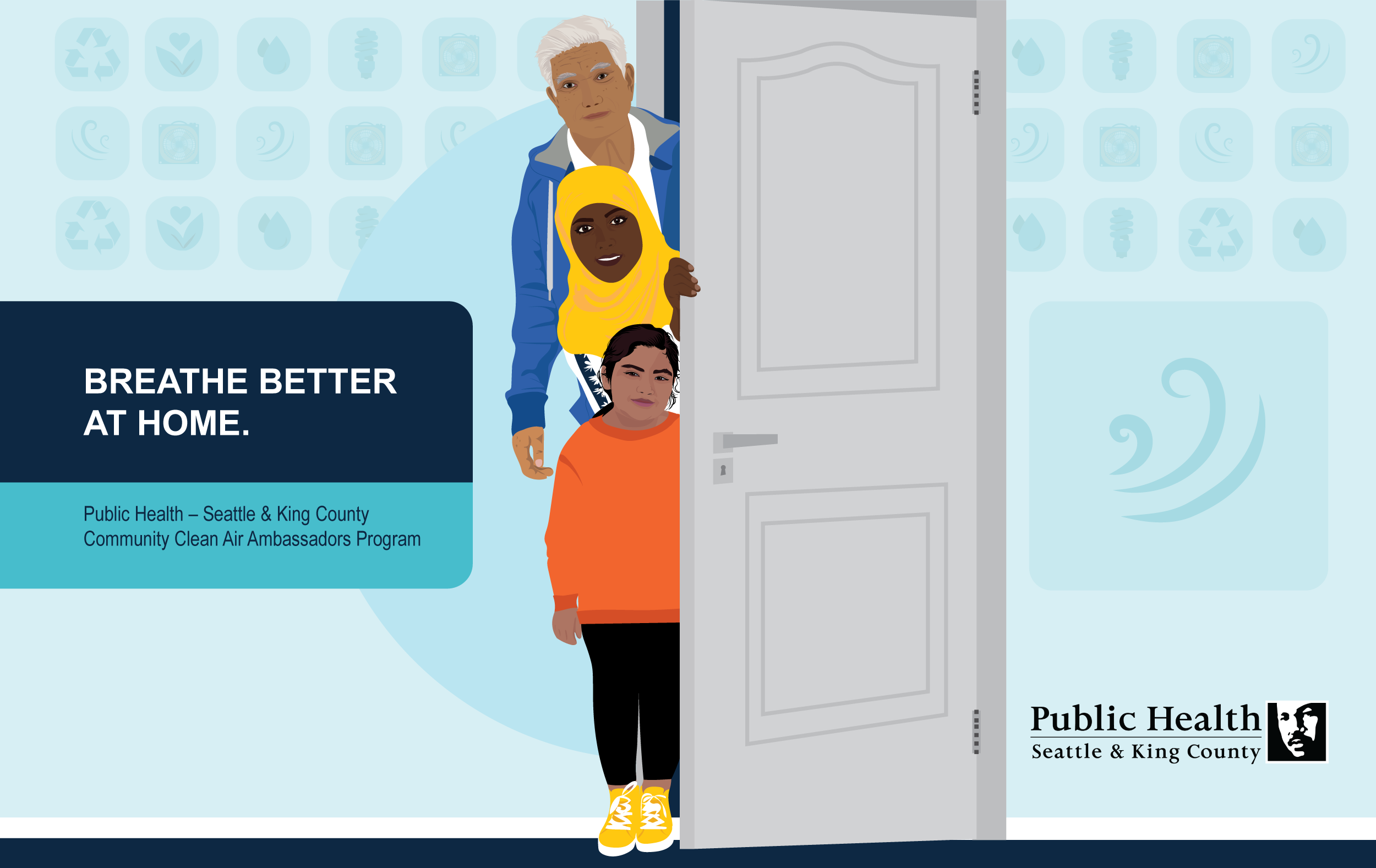
Through our existing and previous partnerships with community-based organizations to distribute low-cost do-it-yourself box fan air filter kits to high priority community groups in preparation and response to regional wildfire smoke events, PHSKC recognized the rising need for awareness on the topic of air quality and particularly, the air we breathe inside our homes, workplaces, shelters, schools etc.—not just in the event of a wildfire but throughout the year. Our priority groups for this work include communities most impacted by the effects of climate change and other social determinants of health, focusing on people of color, limited English speaking populations, immigrant and refugee communities, outdoor workers, folks who live in multigeneration households with older adults, young children and/or pregnant women. For many in these priority communities, indoor air quality does not come up as a priority or a health topic that is well-understood. Understanding that the communities most at risk to the health effects from wildfire smoke are the same communities facing other environmental justice issues, we saw the importance of raising awareness on this topic in a holistic manner as indoor air quality can affect multiple facets of an individual’s health.
The CCAAP focuses on uplifting and empowering priority communities who face environmental racism and health disparities to spread knowledge on indoor air quality and to take action on ways to improve air quality and reduce exposure to risk factors. Essentially, it’s a capacity building program to train community leaders to be able to speak to the importance of indoor air quality and promote it alongside other health topics and resources. PHSKC approached this work through bolstering the leadership and lived experience of our community partners who have been active in educating and mobilizing at-risk communities around environmental justice and climate health issues. We were able to fund two existing partners, the Chinese Information and Services Center (CISC) and Mother Africa with this (NACCHO) award to co-create a training module and accompanying educational tool(s). These two community partners, along with several others in the King County Climate Justice Community Advisory Taskforce, reach priority communities throughout South King County and densely populated neighborhoods in South Seattle. Recognizing this strength in the community partners, PHSKC set the intention for the CCAAP to be sustained within the community beyond the award timeline.
PHSKC completed a co-creation process in developing the CCAAP where the ideas, experiences, and feedback of our community partners are at the forefront of each step of the project. We facilitated regular (bi-weekly) workgroup sessions to plan and organize each aspect of the curriculum module, first, by asking what types of training methods the community partners have found to be effective and then, to draw inspiration from those modules and allowing for creativity in our process. CISC and Mother Africa were then tasked with conducting focus groups and community interviews to collect additional feedback from a broader range of audiences on the curiosities their community members have around the topic of indoor air quality, short and long-term health effects, and what action steps they can take to protect their health. We structured the design of the training curriculum to follow the input from the community voices. Additionally, the idea of our interactive educational tool was collectively brainstormed throughout these sessions with our partners to identify house model illustrating within each room, the “do’s” and “don’ts” for improving indoor air quality. Our workgroup collaborated with a consultant graphic designer/illustrator to incorporate community feedback on each draft of the tool.
In the short period of performance, we were able to accomplish a thorough co-creation process with community partners to produce a training module and an educational tool designed to reach a broad range of audiences across various age, cultural and language groups. This collaborative approach has proven success in many other community engagement and organizing programs, for our program, we continued to learn the valuable lesson of the importance of centering community voices from the beginning and throughout each step of development and embracing the flexible and iterative nature of this work. Through the organic partnerships, we were able to shift, expand and produce a training module that reflects the needs and interests of the community input we collected. We recognize that we were only able to partner with two local organizations with this award, and while CISC and Mother Africa each reach a diverse representation of our priority groups, we did not reach ALL community groups most at risk during this collaboration. We see the products of this program as foundational building blocks that other community leaders locally and nationally can take, adjust, and build upon to utilize them in their own climate and health initiative and programing. Looking towards the future of the CCAAP beyond the award, we hope that the sustainability of the CCAAP will be driven by meaningful community partnership.



